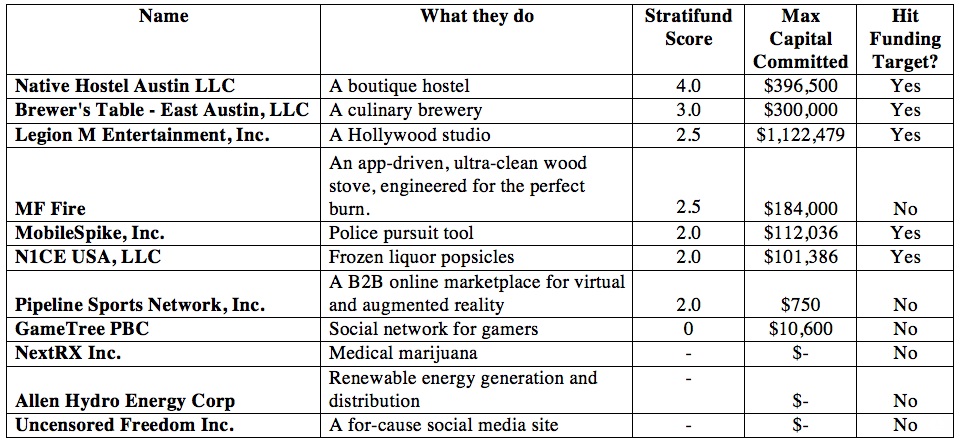[Updated 9/16/2016 to correct MF Fire’s amount raised. The table below originally noted that MF Fire had raised $145,800. In fact, the company raised $184,000.]
The first quarter of Regulation Crowdfunding has come to an end, and it has yielded some valuable lessons for entrepreneurs looking to crowdfund. In order to understand the results, I played a little Monday Quarterbacking with Marc Snover, CEO and an analyst with Stratifund Inc. – a company that provides analysis of debt and equity crowdfunding campaigns. (Disclosure: I’m an advisor to Stratifund.)
Regulation Crowdfunding kicked off on May 16 and allows any American startup or small business to raise up to $1 million from friends, family, and followers on debt and equity crowdfunding platforms registered with the Securities & Exchange Commission (SEC). During the first quarter, 11 companies closed their offerings. Of those, only four managed to hit their funding targets, meaning the majority that closed failed. Keep in mind that under Regulation Crowdfunding, if you don’t hit your funding target before the timeframe runs out, any money that is committed goes from escrow back to the investors.
As soon as a company files its Regulation Crowdfunding offering documents with the SEC and uploads its business plan, financial statements, and other disclosures onto a funding platform’s website, Stratifund’s analysts review the information posted and score the offering. They score each offering by the team, industry, competition, differentiation, and financials. They publish their reports, and because these reports come out prior to a company raising money, I thought it would be interesting to compare how they scored the offering with how the company actually performed and discuss any correlation.
The following table shows you the company, Stratifund’s rank (out of 5 stars – 5 is the highest ranking), maximum amount of capital committed prior to closing, and if they hit their funding target.
As you can see no one scored a perfect 5, and with the exception of Legion M, there does seem to be a correlation between Stratifund’s rating and the amount of capital that flowed into a project. So let’s dig into the findings with Marc.
1. Easy-to-Understand Concept = More Money: According to Snover, “The companies who successfully closed their rounds all did a great job of explaining their concept in easy to understand terms (MobileSpike, N1CE, Legion M, and Native Hostile). The companies who did not hit their funding targets all had fairly complicated concepts. MF Fire, for instance, focused on the technical side of their product. GameTree just had an idea they wanted to bring to market, and Pipeline wanted to create an Ebay for virtual reality products.” Hence if investors are confused about a market opportunity, technology, or just don’t buy into the vision, money will not flow.<
2. Everyday Products Engage Investors: Not only is explaining a concept in simple terms important, but companies with practical uses are getting more attention. The everyday investor can understand the use for a hostel to stay at when traveling. But they may not see the need for an energy efficient fireplace. Snover’s guess is that people largely passed on MF Fire for this reason. “They don’t know if they have the need for one and at first glance don’t know if anyone else does either.”
3. Management Experience is Key: The management teams that succeeded either had success as entrepreneurs in the same industry they are pursuing (Legion M and Native Hostel) or showed they already had a captive audience that had bought into the concept (Mobile Spike with Police Departments and N1CE with concert goers).
4. Lack of Transparency is a Deal Killer: According to Snover, “Allen Hydro and Uncensored Freedom had a lack of transparency, to the point that we chose not to rate them. GameTree fell into this bucket too, but we rated a zero due to the business plan being confusing. It was a poor concept which was at idea stage so no real info was available other than future expectations of management.” GameTree also told investors they are worth $1.5M to $250M? Seriously?
5. Failure isn’t Necessarily Bad: Snover will be the first to tell you that Stratifund also tried its hand at Regulation Crowdfunding and didn’t hit its target. He still considers the move a success, though, because the company was able to increase its customer traction by 300% while the campaign was running, proving that crowdfunding can have additional benefits outside that of capital. And that type of traction might give the company a reason to go back out to the market when the timing is right. “We felt that regardless of the outcome, we needed to show support for the industry that we were helping to legitimize,” said Snover.
So what happened with Legion M? How could a campaign receive over $1 million in capital commitments and not receive a 5-star rating? Snover explained it this way: The company scored high for team (they had prior management experience) and industry (it is large and fast-growing). However, the rating was brought down by competition (it is very high in the entertainment business), differentiation (the business model wasn’t very different other than being a fan-owned business that chose to crowdfund), financials (valuation was higher than average concept-stage companies), use of proceeds (as a bridge to help fund another round of funding), and a high dilution risk (the founders need quite a bit more capital in order to build the company).
“So while the crowd backed it with great fanfare, it may actually not be a great investment for investors in this round,” says Snover. Nonetheless, it does prove that with an engaged audience, investors are willing to take a risk. But keep in mind, if you are going to crowdfund, investors and Stratifund alike want to see funds used to grow a business.
Sherwood Neiss is a partner at Crowdfund Capital Advisors. Neiss helped lead the U.S. fight to legalize debt and equity based crowdfunding, coauthored Crowdfund Investing for Dummies, and cofounded Crowdfund Capital Advisors, where he provides strategy and technology services to those seeking to benefit from crowdfund investing. Neiss and Jason Best are credited as the fathers of Title III of the JOBS Act. After attending the bill-signing ceremony at the White House, they formed Crowdfund Capital Advisors to study what is happening in crowdfunding, analyze results, report trends, and follow opportunities. They are active investors in the crowd finance space.
VentureBeat's mission is to be a digital town square for technical decision-makers to gain knowledge about transformative enterprise technology and transact. Learn More


